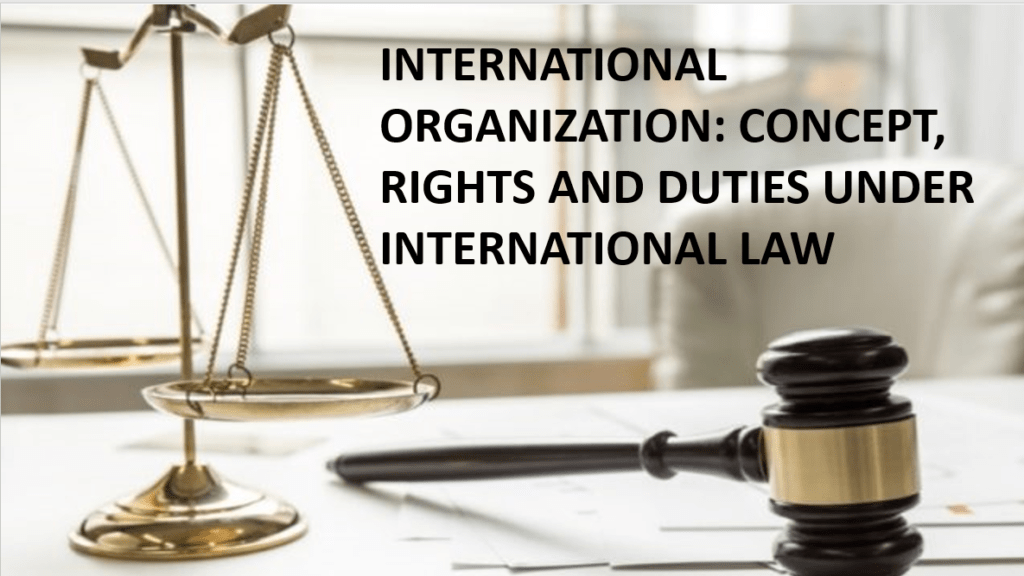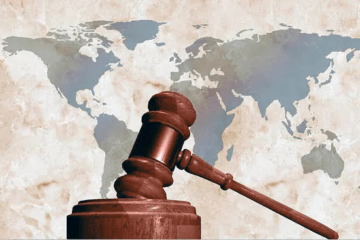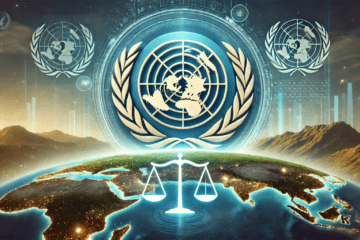
This article is written by Chhavi of 6th Semester of New Law College, Bharati Vidyapeeth Deemed To Be University, Pune, an intern under Legal Vidhiya
ABSTRACT
The article addresses the importance and development of international organizations, emphasizing their historical foundations, the sources of international law, as well as their many forms, characteristics, functions, and rights. Using organizations like the United Nations and World Trade Organization as examples, it highlights the crucial role IOs play in fostering international cooperation, peacekeeping, and legislative activities. The abstract summarizes how IOs came to be through treaties between sovereign states, how international law served as their legal underpinning, and how they performed a variety of roles, including specialized legislative work and dispute settlement. Although acknowledging the ongoing discussion about the rights and obligations of IOs, it emphasizes the unique characteristics of IOs, such as competence, immunity, and sovereignty. Overall, the abstract effectively conveys the essence of international organizations as vital players in tackling global issues and promoting peace within the international community.
KEYWORDS
International Organizations, International Law, History, Sources of International Law, Rights, Duties, Treaties.
INTRODUCTION
The term “International organization (IO)” usually refers to international governmental organizations or associations that are open to membership by any sovereign state. The most well-known IO is the United Nations, which has 191 members. A few more global membership organizations are the Universal Postal Union, the World Trade Organization, and the International Hydrographic Association. The creation of multinational organizations is made possible by treaties that confer legal standing. International organizations have legal protection under international law in addition to the ability to negotiate with other members of their own organization and with other countries.
A collection of treaties and agreements signed between several countries that uphold and promote international cooperation is known as international law. It also governs ties between countries and international relations. Alternatively, we may say that international law is a body of standards that many countries have included into their treaties and customs, and that these norms dictate how countries relate to one another.
International organizations are not like similar enterprises that are only available to member nations within a certain region; instead, they are membership-based worldwide. The European Union, the African Union, and the Organization of American States are a few instances of regional organizations.
HISTORY OF INTERNATIONAL ORGANISATION
The first and oldest international organization was founded by the Congress of Vienna in 1815 and is called the Central Commission for Navigation on the Rhine. Following their victory over Napoleon in 1815, the four European countries convened the Congress of Vienna. First, a new European power balance had to be established in order to maintain peace between the major nations and avoid European imperialism similar to that of the Napoleonic empire. Maintaining the status quo and preventing political upheavals similar to the French Revolution was the second goal.
The conference, which brought together diplomats from different European governments, was chaired by Austrian statesman Klemens Wenzel von Metternich and took place in Vienna between September 1814 and June 1815. The Congress sought to provide a long-term peace plan for Europe by resolving significant problems resulting from the Napoleonic and French Revolutionary Wars. The goal was not merely to restore the old borders but to reshape the major powers in order to balance each other out and preserve peace.
Being conservatives, the leaders saw no purpose for republicanism or revolution. France lost all its recent conquests, while Prussia, Austria, and Russia made important territorial gains. Austria gained Venice and a sizable chunk of northern Italy, while Prussia was awarded 40% of the Kingdom of Saxony and smaller German kingdoms in the west. Russia bought some territory in Poland.
Only a few months prior, the newly formed Kingdom of the Netherlands encompassed territory that had been Austrian until 1830 when it became Belgium.
Disagreements over border arrangements in Eastern Europe between Russia and Prussia and Britain and Austria raised the possibility of hostilities bursting into life. King Louis XVIII of the reinstated Bourbon family was chosen by the British as their ally to head the new French government. France became the fifth great power to join the Grand Alliance when it was requested to send a delegate to the Congress of Vienna. A pact was reached to avert conflict
SOURCES OF INTERNATIONAL LAW
- Conventional sources:
The conventional sources of international law are enumerated in Article 38(1) of the Statute of the International Court of Justice. These materials might be classified as “formal” or “material.” Conventions, traditions, and foundational ideas are examples of formal sources. They have an obligatory nature and are legally binding on the parties involved in their constitution.
- International conventions and treaties- Article 38(1)(a) of the Statute states that the Convention is one of the recognized sources of international law. It states that, in resolving disputes, the court will give special consideration to general or particular international treaties that the contracting party has specifically acknowledged. They are a legally binding written agreement between two or more parties that give reciprocal rights and obligations. Therefore, a convention or treaty has a contractual nature. They may also be known as a memorandum of understanding, covenant, accord, pact, charter, or agreement.
- Customary international law- Custom is acknowledged as one of the oldest sources of international law. Before treaties were formed, customs were the only source of international law. The truth is that different conventions have developed as a result of practices that have adapted to the changing needs of society. Article 38(1)(b) of the Statute of the International Court of Justice provides a synopsis of international custom. It is accepted as the legally permitted custom.
- General principles of international law– The general principles of international law are the third recognized source of international law under Article 38(1). When other traditional sources—such as treaties or customary law—fail to provide a framework for making decisions, this article takes effect. The phrase “general principles of international law as applied to the civil nations” is vague, despite the efforts of numerous scholars to define it. They have long been the subject of debate regarding their legitimacy as a source of international law.
- Judicial Decisions And Juristic Writings– These sources are regarded as secondary or subsidiary interpretations of the primary sources of international law. They are recognized by the International Court of Justice’s Statute, Article 38(1)(d). However, Article 59 specifies that the decisions rendered by the ICJ are only binding on the parties involved and in relation to that particular matter. International courts are therefore exempt from the precedent theory that controls domestic courts. Moreover, not every legal document is accepted as a reliable source of legal authority.
2. Modern/ unconventional sources:
International law is dynamic and always changing. There isn’t a complete list of all international legal sources in the ICJ statute. It recognizes the recently published contemporary sources and takes into account the changes in the global legal community. These sources provide evidence for the existence of traditional sources. Examples of modern sources include decisions taken by the United Nations and its agencies, as well as other international organizations.
- United Nations- The United Nations is an international organization with 193 members that was founded in 1945. The organization seeks to maintain international security and peace as well as to promote cordial relations between states. Its six institutions are the International Court of Justice, Trusteeship Council, Economic and Social Council, Security Council (UNSC), General Assembly, and Secretariat. The decisions and rulings of the UNGA, UNSC, and ICJ are the main sources of law. While the ICJ is considered a classic source, the UNGA and UNSC are considered unorthodox sources.
TYPES OF INTERNATIONAL ORGANISATION
- International Government Organisation
International government organizations are those that are owned by the government and are only established via formal government contracts. The World Trade Organization (WTO) and the United Nations (UNO) are two examples of IGOs.
- International non-governmental Organisations
Considering that these are government-affiliated entities. The private sector and the government play no part at all in nongovernmental organizations, which are exclusively composed of private persons. Their influence over the governance of nations is undeniable. Examples of nongovernmental organizations are Religious Oriented Nongovernmental Organizations and Business Oriented Nongovernmental Organizations.
FEATURES OF INTERNATIONAL ORGANIZATIONS
Sovereignty: Although a State is a sovereign element, an international organization is made up of sovereign States.
Territory: States legally have a defined territory that they exercise authority over; yet, if they do not have an area, they are nevertheless able to exercise some degree of control over one. International organizations, in contrast to States, are not established by means of a show that outlines their constitution, but rather by means of general international law.
Competence: A State possesses traditional skill proficiency. To achieve its objectives, it can link itself through specialized, financial, political, and social relationships. Even with specialized knowledge, an international organization can only accomplish the objectives stated in its charter.
Immunity: States have immunity merely by virtue of being sovereign states; on the other hand, international organizations have immunity conditioned on understanding and restricted to the needs of those organizations’ capacities.
Equality: Under international law, all States are equal, regardless of their size. For international corporations, there is nothing like this.
ROLE OF INTERNATIONAL ORGANIZATIONS
- Specialization in specific fields:
One of the main reasons states create or join independent international organizations is that these groups have the capacity to delegate authority in fields that require resources, time, information, experience, and knowledge that are not always easily accessible. The legitimate operations of international organizations bear consequences for the legitimacy of State activity.
- Political neutrality devoid of conflict of interest:
International organizations are significantly more successful than alternative arrangements at offering a platform for objective, targeted, and depoliticized discussion. They seek to preserve balance between stronger and weaker nations, as well as between knowledge and interests, by defining the exact bounds of ongoing ties between States. This is because international organizations participate in international affairs as unbiased, independent parties, which strengthens the reliability and validity of their individual and collective assessments. Thus, international organizations play a major role in enabling the continuation of international partnership.
- Peaceful resolution of disputes:
International organizations can play a vital role in maintaining international law by facilitating the peaceful settlement of disputes. Without the establishment of such a system, the world would descend into the Hobbesian “State of nature,” where everyone is at war with everyone and existence is “nasty and brutish,” leaving everyone on the planet in a condition of everlasting anarchy. All of these organizations have ratified the United Nations Charter, which requires all of its members to settle international disputes peacefully in order to uphold justice, security, and peace on a worldwide scale.
- Legislative functions:
International organizations handle the drafting of treaties, regulations, frameworks, and other specialized legislative and supervisory activities. But it doesn’t operate like a world parliament. For instance, adherence to resolutions passed by the United Nations Security Council is compulsory for member states. The World Health Organization, the International Labor Organization, and the International Civil Aviation Organization all perform comparable specialized legislative and regulatory functions.
RIGHTS AND DUTIES OF INTERNATIONAL ORGANIZATIONS
There is much controversy about whether international organizations meet the requirements for having an international legitimate character and if they are therefore entitled to certain inherent rights, obligations, and limits. While some authors contend that an organization’s rights and obligations are outlined in its charter and should be correlated with its capabilities, others contend that international organizations, like states, are naturally able to carry out any demonstration of international law that fits within a reasonable organizational structure.
Rights and Duties Of International Organizations:
- The ability to enter into contracts.
- Right to immunity from State ward for activities and actions carried out by the group.
- The organization experts’ right to certainty when operating within the boundaries of their authority within a third state.
- The ability to send and receive legations.
- The right to pursue a foreign lawsuit to recover damages caused to the organization or its authority by third-party or member states.
- Oblige to compensate for damages caused by the organization or its agents.
CONCLUSION
In the modern world, international organizations are vital for promoting collaboration, preserving peace, and influencing international law. International organizations such as the United Nations and WTO, are international organizations that function across national borders. They are derived from treaties and agreements between sovereign governments. International law, which includes both traditional and contemporary sources such as treaties, norms, and rulings from organizations like the UN, provides these organizations with legal footing.
Immunity, equality before the law, competence, sovereignty, and territory are among the distinctive qualities of international organizations. They participate in legislative activities, promote peaceful dispute resolution, maintain political impartiality, and have a wide range of areas of expertise—all of which help to promote global governance. Even though opinions on their fundamental rights and obligations differ, international organizations are still blessed with significant rights like the ability to contract, immunity from state law, and the ability to file lawsuits overseas. But they also have to make up for whatever harm their actions have brought about.
In summary, international organizations serve a crucial role in addressing global concerns, promoting cooperation, and upholding the foundations of international law—all of which support the growth of a more harmonious and peaceful global community.
REFERENCES
- https://www.usip.org/i-international-organizations-0#:~:text=International%20organizations%20are%20subjects%20of,states%20from%20a%20particular%20region
- https://www.legalserviceindia.com/legal/article-7340-international-organization-as-a-subject-of-international-law.html#:~:text=These%20rights%20and%20obligations%20include%3A&text=Right%20to%20send%20and%20get,the%20organization%20or%20its%20representati
- https://www.slideshare.net/karimrayati/history-of-international-organization-59955043
- https://education.nationalgeographic.org/resource/international-organization/
- https://lawexplores.com/international-organizations/
Disclaimer: The materials provided herein are intended solely for informational purposes. Accessing or using the site or the materials does not establish an attorney-client relationship. The information presented on this site is not to be construed as legal or professional advice, and it should not be relied upon for such purposes or used as a substitute for advice from a licensed attorney in your state. Additionally, the viewpoint presented by the author is of a personal nature.




0 Comments